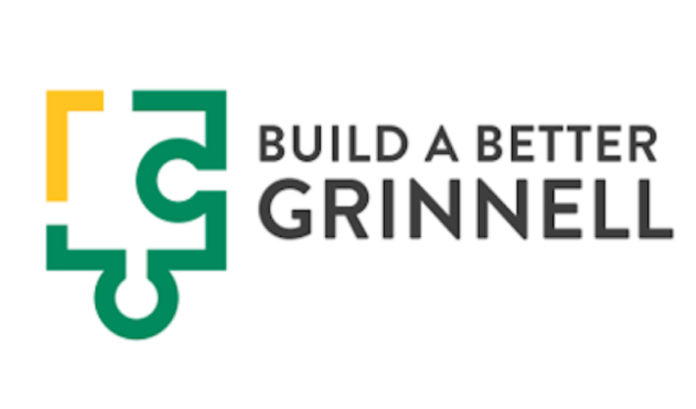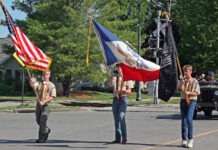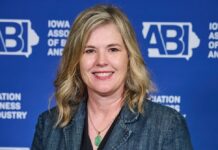Build a Better Grinnell 2030 receives $197,153 USDA Rural Placemaking Innovation Challenge grant
GRINNELL, Iowa — Build a Better Grinnell 2030 (BABG 2030) has received a grant of $197,153 from the U.S. Department of Agriculture’s Rural Placemaking Innovation Challenge. These funds will support the mission of the BABG 2030 project: to identify and prioritize community needs as well as resources, assets, and partners to guide community development and quality-of-life improvement over the next decade.
This is the first project in Iowa supported by the USDA’s Rural Placemaking Innovation Challenge program. The grant was secured in partnership with the Greater Poweshiek Community Foundation; BABG Research Director Monty Roper, associate professor and department chair of Anthropology at Grinnell College; and Grinnell College’s Office of Community Partnerships, Planning, and Research.
Nicole Brua-Behrens, executive director at the Greater Poweshiek Community Foundation, shared, “This grant represents a true collaborative community effort that will take this project to the next level by greatly expanding the ability to gather data from all community members in a variety of ways and methods.”
The project’s collaborative research process will focus on the following goals:
- Building community pride and facilitating positive branding by identifying community strengths
- Enhancing organizational connections and community cohesion and building a commitment to action around a set of priorities through a collaborative and broadly participatory process
- Facilitating community growth and development for the next decade by identifying and illuminating the local context of a prioritized set of needs, together with community assets and policy options, that are actionable, impactful, and easy to understand.
The city of Grinnell, Grinnell Mutual, Grinnell College and the Claude & Dolly Ahrens Foundation have each committed $10,000 to fund the project, which will be guided by a 20+ person steering committee representing a broad range of local constituents and community members.
Monica Chavez-Silva, Vice President of Community Engagement and Strategic Planning at Grinnell College, shared, “This project is an amazing example of people from all across the community coming together to work on something that we all care about – the future of our community. Every single person working on the project brings different skills, experiences, and perspectives, which, together, will make the work stronger.”
Karen Neal, Grinnell resident and director of the Drake Community Library, added, “Grinnell is an amazing place to live and work. Build a Better Grinnell is an excellent example of one of several community collective impact projects that support our families now and into the future. This project seeks broad participation and inclusion to find community strengths, weaknesses and needs. I’m excited to roll up my sleeves and get to work.”
The first research phase of the project is underway, and project leaders are asking community members, individuals who work in Grinnell, and those who depend on Grinnell for key resources to participate and provide input by answering a set of questions posed in our community-engagement tool: “Visions of Grinnell Workbook.” This can be done as a self-guided focus group interview or completed individually. The input requested covers topics of needs, community assets, values, strengths, and visions of Grinnell. The survey is available in printed and digital formats; visit the website to take the survey or learn where to pick up a paper copy.
Please reach out to project coordinator Bel Kugel at bel@buildabettergrinnell.org with questions about the project or to learn how to get involved. Visit www.buildabettergrinnell.org to learn more.
Build a Better Grinnell Committee Members
Steering Committee: Barb Baker, Russ Behrens, Nicole Brua-Behrens, Sondi Burnell, Shauna Callaway, Monica Chavez-Silva, Phil Culham, Jennifer Cogley, Sam Cox, Emily Fenner, Melissa Ford, Julie Gosselink, Rachael Kinnick, Avery Lindley, Kris Morrison, Chad Nath, Karen Neal, Brian Paul, Daniel Ramos, Helen Redmond, Ashley Risting, Monica St. Angelo, Melissa Strovers, Janet Stutz, Loyal Terry, Deanna Vogt, MaeLeigh Wacha and Mattia Wells.
Research Team: Monty Roper; Research Director, and Bel Kugel: Project Coordinator.
###
About Build a Better Grinnell 2030
Build A Better Grinnell 2030 is a non-partisan research-driven project which aims to help residents and community changemakers make informed decisions about the Grinnell community and plan for the future.
About Greater Poweshiek Community Foundation
The Greater Poweshiek Community Foundation (GPCF), located in Grinnell, Iowa, assists donors in efficiently and effectively supporting nonprofit organizations that make life better for people in the area. Through the foundation, donors are able to make long-lasting positive contributions without being burdened by administrative or legal complexities. GPCF also provides grants to charitable organizations across Poweshiek County. For more information about GPCF, visitwww.greaterpcf.org.
About Grinnell College
Grinnell College, a private liberal arts college in Iowa founded in 1846, provides individually advised learning for intellectually engaged students to produce graduates who are prepared to navigate the world’s complexities and responsibly contribute to the common good. Grinnell enrolls 1,700 students from around the world, who earn B.A. degrees in a range of disciplines across the humanities, arts and sciences. Grinnell’s rigorous academic program and campus life emphasize excellence in education through free inquiry and the open exchange of ideas, a diverse community, and social responsibility and action. More information about Grinnell College is available at www.grinnell.edu.





